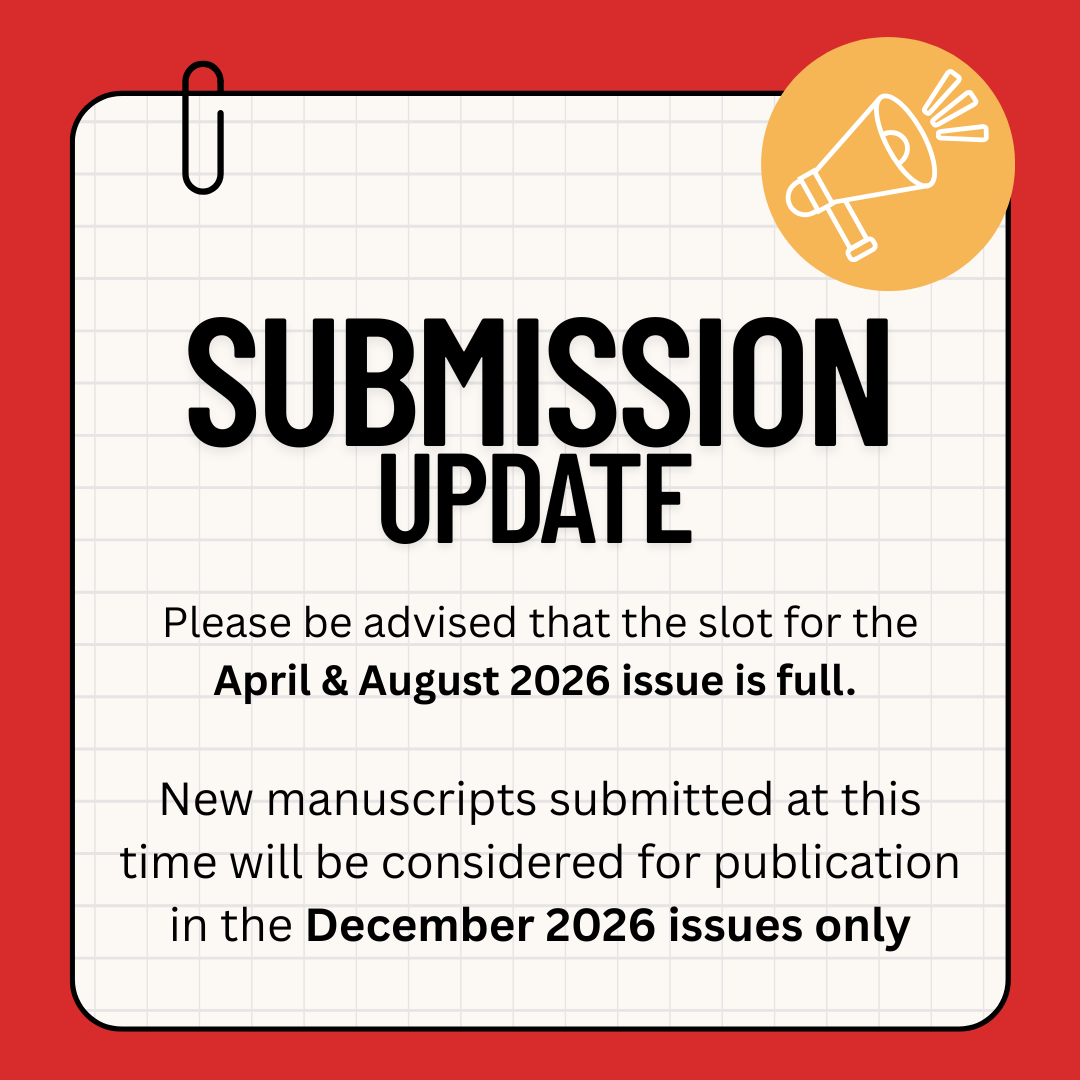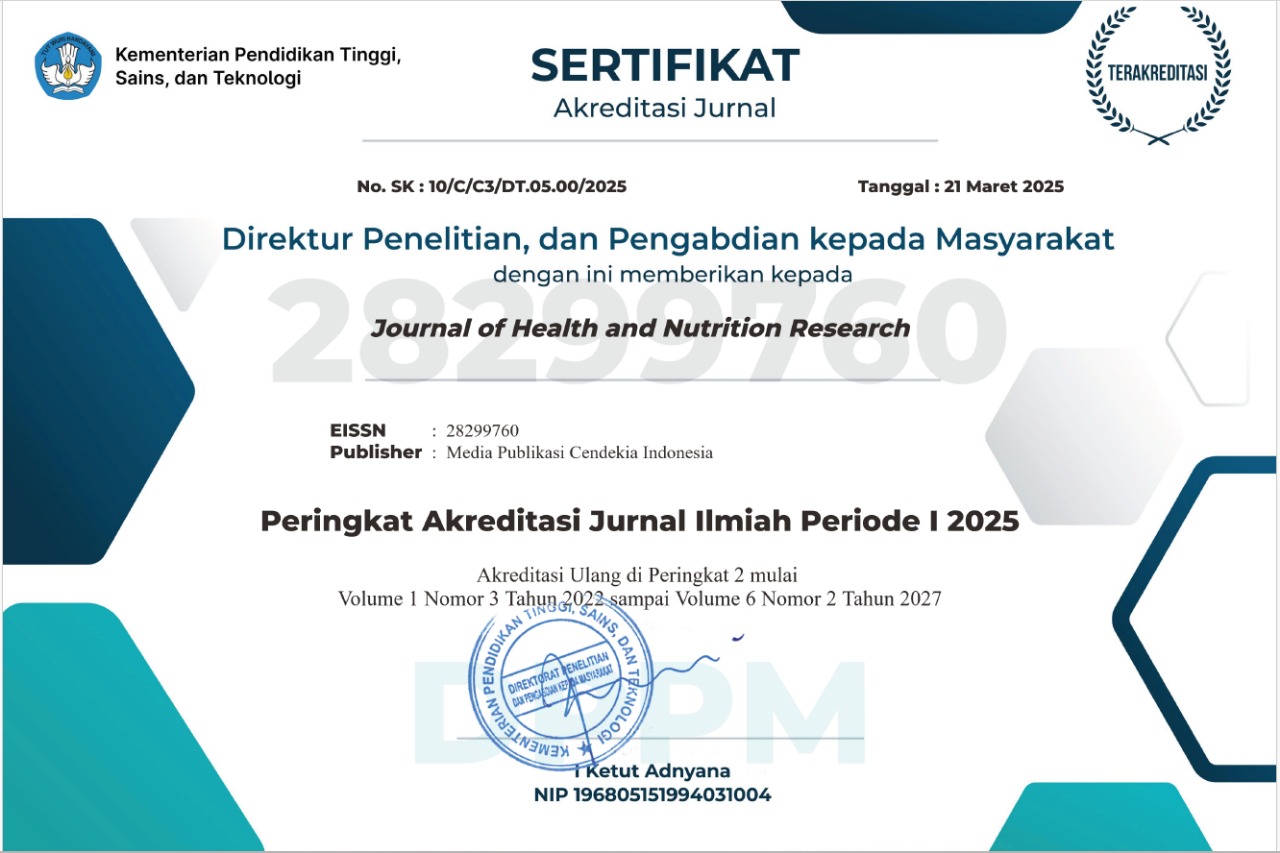Substitution of Desiccated Coconut on The Physicochemical and Organoleptics of Crispy Cookies
Keywords:
Crispy Cookies, Desiccated Coconut, Wheat Flour, SubstitutionAbstract
Research on coconut flour and desiccated coconut substitution cookies has been conducted by several researchers, but variations of desiccated coconut crispy cookies have not been widely developed. The nutritional content of desiccated coconut can be used as a source of fiber when substituted in crispy cookies products. The purpose of this study was to determine the effect of desiccated coconut substitution in making crispy cookies on physicochemical and organoleptic characteristics, and obtain the best desiccated coconut substitution. This study used a Complete Randomized Design (RAL) with one factor, namely the ratio of the percentage of desiccated coconut and wheat flour with 6 treatment levels (0:100), (25:75), (50:50), (75:25), (85:15), and (100:0) with 3 repeats. The data obtained were analyzed using the ANOVA test (α=5%). If the effect is significant (Sig < 0.05), then proceed with the Honest Real Difference Test (BNJ) with a test level of 5%. Analysis of sensory characteristics data using the Kruskal Wallis test. The best treatment is tested using an effectiveness index test. This study obtained the best sensory and physicochemical characteristics of desiccated coconut crispy cookies in treatment (25%: 75%). The physicochemical characteristics produced are crude fiber content of 2.73%, fat content of 30.43%, ash content of 1.52%, water content of 16.86%, carbohydrate content of 51.11%, and protein content of 0.08%. The resulting sensory characteristics are taste 4.36 (prefer), aroma 4.13 (prefer), color 3.97 (like), and texture 4.26 (prefer).
Downloads
References
Nugraha RA. Pemanfaatan Tepung Pisang Kepok Putih Dan Tepung Kacang Hijau Dalam Pembuatan Crispy Cookies Sebagai Snack Sumber Serat Dan Rendah Natrium. Vol. 4, ARGIPA (Arsip Gizi dan Pangan). 2020. p. 94–106.
Goldstein. Bon Appetit [Internet]. Bon Appetit. 2022 [cited 2023 Mar 22]. Available from: https://fatdaddios.com/methods-techniques-for-cookies/
Mustinda. Detik Food [Internet]. 2016 [cited 2023 Mar 23]. Available from: https://food.detik.com/info-kuliner/d-3240502/bagaimana-perbedaan-cookies-bertekstur-crispy-cakey-chewy-dan-gooey
Nuroso A. Pengolahan Kelapa Parut Kering (Desiccated Coconut) Di Pt. Kokonako Indonesia Pulau Palas Indragiri Hilir Riau. Vol. 2, Jurnal Teknologi Pertanian. 2013. p. 50–6.
McKenzie. McKenzie’s Food [Internet]. 2022 [cited 2023 Mar 25]. Available from: https://www.mckenziesfoods.com.au/product/mckenzies-fine-desiccated-coconut/
S K, B D. Daya Guna Hasil Kelapa. Agroindustri Press IPB. Bogor; 1985.
K.D.P.P G, Chamila T, A.A.N K. Nutritional Composition of Dikiri Coconut. Cord. 2009;25(2):56–62.
Kusharto, M C. Serat Makanan dan Perannya Bagi Kesehatan. J Gizi dan Pangan. 2006;1(2):45–54.
Hardiyanti, Nisah K. Analisis Kadar Serat Pada Bakso Bekatul Dengan Metode Gravimetri. Vol. 1, Amina. 2021. p. 103–7.
Sandrasari DA, Chusna AC. Karakteristik Crispy Cookies Kaya Serat Berbahan Dasar Rumput Laut. Vol. 2, Jurnal Teknologi Pangan dan Kesehatan (The Journal of Food Technology and Health). 2020. p. 105–14.
AOAC 1995. 16th ed.
Amelia MR, Nina D, Trisno A, Julyanty SW, Rafika NF. Penetapan Kadar Abu (AOAC 2005). Aoac 2005. 2016. p. 43.
Anam K. Pengukuran Kadar Protein dengan menggunakan Metode Bradford. 2012. p. 1–4.
D Y. Petunjuk Praktikum Biokimia I. 2018;
BSN (Badan Standarisasi Nasional). Cara Uji Makanan dan Minuman. SNI 01-2891-1992. 1992;
Akhmad Zakaria. Pengaruh Penambahan Variasi Konsentrasi Tepung Rosella (Hibiscus sabdariffa Linn) Terhadap Sifat Organoleptik Cookies Almond Crispy. Agroscience. 2019;9(2):189–202.
De Garmo E., Sullivan WG, Canada JR. Engineering Economi. 7th, editor. London: Collier Mc Millan; 1984.
Mrak EM, Schweigert BS, Scheming AF. Food Processing. A Guidebook to California Agriculture. 2023. p. 301–16.
Hood L. Carbohydrates and Health. AVI Publishing Company Inc.; 1980.
Astriella Awwali Maissy. Pengembangan Model Matematik Untuk Menentukan Umur Simpan Produk Cookies Garut (Maranta arundinacea) Dalam Kemasan Tunggal Dengan Variasi Kelembaban Udara Ruang Penyimpanan. Yogyakarta: Skirpsi Universitas Gadjah Mada; 2018.
Herawati H, Kusbiantoro B, Rismayanti Y. Pemanfaatan Limbah Pembuatan Vco. Vol. 50501. p. 18–9.
Winanro F.G. Kimia Pangan dan Gizi. Jakarta: Gramedia Pustaka Umum; 2008.
Sudirman S, Ninsix R. Pengaruh Penambahan Tepung Ampas Kelapa Dengan Tepung Tapioka Terhadap Cookies. Vol. 4, Jurnal Teknologi Pertanian. 2015. p. 30–41.
Ingredients GG&. Desiccated Coconut [Internet]. 2021 [cited 2023 Sep 9]. Available from: https://www.globalgrains.co.uk/nuts-dried-fruits/nuts/desiccatedcoconut/%0D
Trianti. Karakteristik Nugget Surimi Ikan Manyung (Arius thalassinus Ruppell) Dengan Substitusi Tepung Ubi Jalar Ungu (Ipomea batatas L.). Pontianak: Skirpsi Universitas Tanjungpura; 2019.
Wanti T, Herawati N, Fitriani S. Pemanfaatan Pure Ubi Jalar Kuning Dan Ampas Kelapa Kering Dalam Pembuatan Kukis. Vol. 18, Sagu. 2019. p. 19–26.
Polii FF. Pengaruh Substitusi Tepung Kelapa Terhadap Kandungan Gizi dan Sifat Organoleptik Kue Kering. Vol. 18, Buletin Palma. 2017. p. 91–8.
Koeswardhani. Dasar-dasar Teknologi Pengolahan Pangan [Internet]. Vol. 12, Modul Bahan Ajar. 2014. p. 1–60. Available from: http://repository.ut.ac.id/4619/1/PANG4312-M1
Khasanah U. Formulasi, Karakterisasi Fisiko-kimia dan Organoleptik Produk Makanan Sarapan Ubi Jalar (Sweet Potato Flakes). Bogor: Skripsi Institut Pertanian Bogor; 2003.
Afrianti F, Efendi R, Studi Teknologi Hasil Pertanian P, Pertanian T, Pertanian F. Pemanfaatan Pati Sagu dan Tepung Kelapa Dalam Pembuatan Kue Bangkit. Vol. 3, Jom Faperta UR. 2016. p. 1.
Afiatul Rahmi Fatty. Pengaruh Penambahan Udang Rebon Terhadap Kandungan Gizi Dan Hasil Uji Hedonik Pada Bola-Bola Tempe. Depok: Skripsi Universitas Indonesia; 2012.
Mahayothee B, Koomyart I, Khuwijitjaru P, Siriwongwilaichat PMN, Müller J. Phenolic Compounds, Antioxidant Activity, and Medium Chain Fatty Acids Profiles of Coconut Water and Meat at Different Maturity Stages. Int J Food Prop ISSN. 2016;19:2041–951.
Mudjajanto E., Yulianti L. Membuat Aneka Roti. Jakarta: Penebar Swadaya; 2006.
Rosida DF, Putri NA, Oktafiani M. Karakteristik Cookies Tepung Kimpul Termodifikasi (Xanthosoma sagittifolium) Dengan Penambahan Tapioka. Vol. 14, Agrointek. 2020. p. 45–56.
Published
How to Cite
Issue
Section
Copyright (c) 2024 Maria Mega Sari, Suko Priyono, Nur Endah Saputri, Yudi Rahmadian

This work is licensed under a Creative Commons Attribution-NonCommercial-ShareAlike 4.0 International License.
Most read articles by the same author(s)
- Supermanto Supermanto, Suko Priyono, Sulvi Purwayantie, Nur Endah Saputri, Dzul Fadly, Dwi Ayuni, Study of The Temperature and Timing Roasting of Black Glutinous Rice and Robusta Beans on The Quality of Coffee Powder , Journal of Health and Nutrition Research: Vol. 1 No. 2 (2022)
- Sulvi Purwayantie, Dzul Fadly, Sholahuddin, Nur Endah Saputri, Sri Wijanarti, Antioxidant Activity From Multiple Extraction Of Kratom Leaf (Mitragyna speciosa) Without Veins With Sonicator-Type Bath , Journal of Health and Nutrition Research: Vol. 1 No. 3 (2022)
- Michelle Nattaya Narerat Nuraini, Sulvi Purwayantie, Lucky Hartanti, Nur Endah Saputri, Effect of Carboxyl Methyl Cellulose Addition and Heating Time on The Production of Keribang Barbant Jam (Dioscorea alata L.) , Journal of Health and Nutrition Research: Vol. 2 No. 3 (2023)
- Dayang Dwi Juwitaningsih, Suko Priyono, Nur Endah Saputri, Effect of Honey Type on Chemical and Sensory Quality of Kratom Herbal Tea (Mitragyna speciosa) , Journal of Health and Nutrition Research: Vol. 3 No. 1 (2024)



















